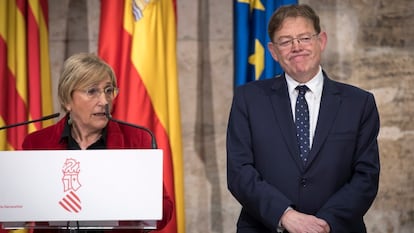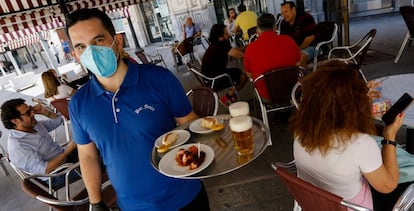In Spain, Valencia stands alone in not requesting looser lockdown
Unlike most other parts of the country, the Mediterranean region has not asked the Health Ministry to move to Phase 2 of the coronavirus deescalation plan

The Valencia region has become the first area of Spain to voluntarily slow down its coronavirus deescalation process.
The eastern territory will wait one more week before requesting a transition to Phase 2 of the four-phase plan introduced by the central government to slow the spread of Covid-19. The decision comes after regional health authorities detected a slight spike in contagion figures.
“We don’t have any outbreaks, but we want to wait out this week,” said the regional health chief, Ana Barceló. “We will remain in Phase 1 for another seven days.”
We don’t have any outbreaks, but we want to wait out this weekRegional health chief Ana Barceló
Parts of the Valencia region moved up from Phase 0 to Phase 1 nearly two weeks ago, while the remainder of the territory was bumped up this past Monday. This stage allows for limited social interaction and some business activity.
Valencia authorities had said a few days ago that they would request Phase 2 for the entire region, but according to Health Ministry criteria, each phase lasts two weeks, a period of time that 14 healthcare areas in the Valencia region have not yet completed.
Valencia stands alone in its decision to stay put, as all other regions of Spain have requested authorization to move up to the next stage of deescalation. While much of the country is already in Phase 1, the Madrid region, Barcelona and a large part of Castilla y León remain in Phase 0.
Madrid battle
In the Madrid region, which has been the epicenter of the coronavirus pandemic and which posted the country’s worst infection figures for the week of May 12 to 19 (1,374 new cases), deescalation is quickly morphing into a political issue rather than a public health one.
The regional government, which is run by a center-right coalition of the Popular Party (PP) and Ciudadanos (Citizens), on Wednesday decided to file an appeal with the Supreme Court to determine why the Health Ministry has twice denied Madrid’s request to transition to Phase 1.
Premier Isabel Díaz Ayuso has made a third request for Madrid to enter Phase 1 next week. The central government’s decision will be announced on Friday. Earlier decisions to hold the region back have been met with protests in some parts of the city, where marchers have claimed the government is curtailing their freedoms.
“We have serious reservations about whether technical criteria are being applied in the same way across all the regions,” said the regional health chief, Enrique Ruiz-Escudero.
This department claims that other parts of Spain with worse coronavirus figures and lower testing capacity than Madrid have been allowed to move to Phase 1. “The only known report is the one that was issued to ensure our region would not change phases, and it was signed three hours after we were informed of the decision,” said Ruiz-Escudero.
The Madrid government says that it has launched a coronavirus contact tracing plan, shored up its primary healthcare system, and has the ability to conduct 15,000 PCR tests a day. But these assertions have been challenged by dozens of professionals from the Madrid Health Service (Sermas), as well unions and medical associations.
Catalonia
Catalonia, whose own figures were only slightly better than Madrid’s for the May 12-19 period (857 cases), has waited until now to make the first request for the Barcelona metropolitan area to move to Phase 1.
The regional government has been following a strategy of requesting phase changes asymmetrically. The first areas to enter Phase 1 were the province of Tarragona and the demarcation of Pirineo de Lleida. This past Monday, Girona and Catalunya Central joined the Phase 1 group.
The Catalan government now wants the first areas to move to Phase 2, and for the Barcelona metropolitan area to enter Phase 1.
Rest of Spain
Castilla y León is the only other region of Spain where parts of the territory are still in Phase 0. Authorities have now requested permission to move the entire region to Phase 1.
Andalusia wants all eight provinces to achieve Phase 2 status, even though Málaga and Granada have only been in Phase 1 for one week, when the Health Ministry’s guidelines say that two weeks is the minimum period for each phase.
In Aragón, the regional government is working on an alternative plan so that if the city of Zaragoza is held back, the rest of the region can still move ahead to Phase 2. The small northern regions of Asturias and Cantabria want to move to Phase 2 and they are also requesting more flexible conditions for walks, exercise and business activity.

In Castilla-La Mancha, authorities will ask for Cuenca and Guadalajara to transition to Phase 2. The government of Galicia wants the entire region to achieve Phase 2 status, as do Extremadura, Navarre and La Rioja.
Murcia, which has one of the lowest infection figures for the week of May 12 to 19, wants to move to Phase 2 while maintaining a few restrictions from Phase 1, such as keeping social gatherings down to 10 people instead of 15.
In the Basque Country, regional officials are requesting Phase 2 and planning to reopen schools for last-year students of secondary education as well as post-secondary students.
The Canary Islands will ask the Health Ministry to move the five islands that are still in Phase 1 up to Phase 2, joining La Gomera, Hierro and La Graciosa. In the Balearic Islands, it is hoped that Mallorca, Menorca and Ibiza will join Formentera in Phase 2 next Monday.
With reporting by Isabel Valdés, Eva Sáiz, Sonia Vizoso and Pedro Gorospe.
English version by Susana Urra.
Tu suscripción se está usando en otro dispositivo
¿Quieres añadir otro usuario a tu suscripción?
Si continúas leyendo en este dispositivo, no se podrá leer en el otro.
FlechaTu suscripción se está usando en otro dispositivo y solo puedes acceder a EL PAÍS desde un dispositivo a la vez.
Si quieres compartir tu cuenta, cambia tu suscripción a la modalidad Premium, así podrás añadir otro usuario. Cada uno accederá con su propia cuenta de email, lo que os permitirá personalizar vuestra experiencia en EL PAÍS.
¿Tienes una suscripción de empresa? Accede aquí para contratar más cuentas.
En el caso de no saber quién está usando tu cuenta, te recomendamos cambiar tu contraseña aquí.
Si decides continuar compartiendo tu cuenta, este mensaje se mostrará en tu dispositivo y en el de la otra persona que está usando tu cuenta de forma indefinida, afectando a tu experiencia de lectura. Puedes consultar aquí los términos y condiciones de la suscripción digital.








































